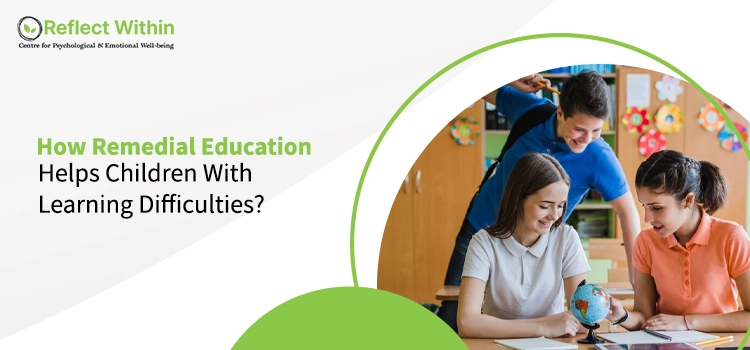
Children face many academic difficulties like being slow while reading, not reading correctly, missing lines when reading aloud, repetitive spelling mistakes, handwriting having poor sequence, not being able to perform simplest mathematical problems. These problems further lead to not being able to achieve good school grades which corresponds with their intellectual abilities.
These issues generally exist due to underlying conditions such as Specific Learning Disability, etc.
There are mainly three types of Learning Disabilities that can be classified as:-
- Dyslexia can be defined as specific learning disability syndrome involving an impairment of the previously acquired ability to read; unrelated to the person’s intelligence. Reading requires an individual to have the ability to understand phonetics. The reading disorder of dyslexia affecting children has found to be the most common as it accounts for 80% of all those are identified as having learning disability.
- Dyscalculia can be defined as a specific learning disability syndrome generally characterized by difficulty in learning or understanding mathematical operations.
- Dysgraphia can be defined as a specific learning disability which is generally characterized by distorted writing despite thorough instruction.
Once these children are backed by giving sufficient support and evidence based instructions, they have potential of reaching age appropriate levels. One such evidence -based intervention is Remedial Education.
What Is Remedial Education ?
Sometimes, children experience difficulty in certain areas of learning and therefore, special intervention is required to bridge this learning gap and enable students to grasp concepts with ease. That’s when Remedial education comes into play. According to APA, Remedial Therapy is an intervention aimed at assisting a person to achieve a normal or increased level of learning when performance is below expectations in a particular area.
It helps them achieve expected competencies and skills in the core academic areas, especially in literacy and numeracy.
Students who face difficulty grasping topics in a classroom are given different educational strategies like refined practice, repetition of content, and clarification. Whereas, in some cases, individual attention is provided so that the topic is easily picked up by the student.
Remedial educators use the necessary instructional techniques to help students overcome any learning obstacles and achieve their full potential. The majority of these remedial programs are done in junior high and high school, where the student is first exposed to the fundamental ideas of education.
A remedial educator can assist the students by teaching the fundamentals of reading, written language, math, and study/organizational skills using innovative, multisensory approaches and practices. It has been demonstrated that using these strategies can improve student learning. If they are taught using such plans and techniques, students are taught to make use of their strengths, talents, and abilities while also overcoming their weaknesses.
The core areas of remedial education programs are:
- Reading and comprehensive skills.
- Writing skills, including spelling, handwriting, etc.
- Ability to do maths.
- Ability to process information.
- Functional academics.
- Scholastic and social skills.
When Is Remedial Therapy Required?
Remedial education, also known as developmental education, can help the child who experiences difficulties in the following areas:
- Child with low attention span, who find it difficult to pay attention or focus on an activity for a long time.
- Difficulty in understanding multiple instructions or comprehending a concept.
- Students with dyscalculia, which is a persistent difficulty in understanding numbers or mathematical signs, affect their ability to do maths.
- Dysgraphia affects the fine motor skills and ability of students to write letters.
- Dyslexic children who face difficulty in reading and spelling words accurately and fluently.
- Inability to develop cognitive strategies in order to learn or grasp concepts in a sequence.
- Besides, it can help students who find it hard to speak or form meaningful sentences.
- Developmental educational programs can also help children with scholastic skills and social behaviour.
Types Of Remedial Teaching Helpful For Children With Special Learning Needs
Remedial teaching programs are tailored to meet the specific learning requirements of the children. Thus, these programs help them reach their fullest potential and succeed in their academics. Some of the most effective forms of development teaching programs are:
Individual Remedial Teaching
It is the best approach to help kids overcome their learning obstacles with dedicated teaching to the individual students. It involves one-on-one interaction between the remedial special educator and the student, wherein the teacher first assesses the learning needs, abilities, and challenges of the student. Thereafter, the developmental education techniques and materials for the student are designed to address their learning challenges and help them improve.
Group-Based Developmental Teaching
Group-based remedial education can benefit students with the similar learning challenges. Not only they learn from the educator, but they also see and learn how other students are coping with their learning challenges. The setup consists of the small group of students and an educator enabling students to learn collaboratively. In addition to the peer learning, it also helps students foster social skills. Furthermore, group learning activities can make the process fun and effective for them.
Multi-Sensory Remedial Education
Multi-sensory remedial education, as the name itself suggests, engages multiple senses in learning, mostly visual and auditory senses. Furthermore, tactile (based on touch) and Kinesthetic (based on movement) senses can also be introduced to enhance the effectiveness of the remedial teaching. When multiple senses are involved, learning procedure becomes fun, engaging and impactful. This teaching method can benefit students who have one or more weak senses.
Technology-Supported Remedial Learning
Technology is already playing a major role in learning in this digital era. Besides, regular developments are being made to promote technology as a means of education, especially for those who have different learning needs from those of their peers. Technology enables students to utilize their strengths to overcome their limitations and support their learning process by offering different resources, such as educational apps, multimedia, digital learning support and several others.
Peer-Aided Remedial Teaching
Peer-assisted remedial education enables a learning environment wherein students help each other in the learning process. It is beneficial for all who are providing the learning support and those who are receiving it. Some of the common forms of peer-supported remedial teaching are partnered reading, group projects, peer teaching, etc. Furthermore, it encourages competitive learning in which the students engage more and can learn by watching others.
Play-Based Remedial Teaching
Play-Based remedial learning establishes a positive and nurturing classroom culture, wherein every student feels included and valued. Besides, playful and interactive learning techniques enables students to develop interest in the learning process and doesn’t make it ordeal. Those who struggle to learn concepts in traditional class settings can learn better in a playful and fun environment.
Skill-Based Remedial Therapy
This is a targeted approach to the remedial therapy, which focuses on the special skills that needs to be inculcated or improved among the student. It may include mathematical operations, reading comprehension, writing abilities, speaking, or social skills. It may include a variety of the activities to be practiced by the students to develop certain skills. If a student is lacking any specific skill, this remedial therapy intervention can be helpful.
Benefits of Remedial Therapy
Remedial education can have varied advantages in nurturing a child’s learning. Some of the most applauded advantages are:
- It can help students who need special assistance in their academic skills, such as reading, writing, or doing mathematical operations.
- It can also help students enhance their cognitive skills so that they can comprehend what they read and understand multiple instructions.
- Students who have difficulty forming interpersonal relationships with others can improve their social skills.
- It enables students to understand their behavioural patterns, thereby promoting self-awareness and regulation among them.
- Attention-deficit students can improve their ability to sit and focus on something for a longer time.
Remedial teaching involves interactive teaching methods and techniques so that students feel included and learn more efficiently.
Closure
This post elaborates on how remedial therapy can help children with learning difficulties. The role of parents and the surrounding environment of the children also play a crucial role in supporting them with their learning hardships. However, professional intervention is always recommended to address the special needs of the students efficiently.
Reflect Within strives to improve the academic performance of the students by indulging them into the best remedial education programs after assessing their learning concern areas.










